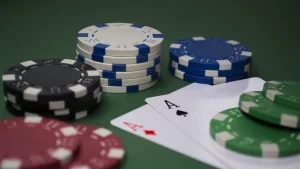What is an Angle Shoot in Poker

In the competitive realm of poker, a game deeply rooted in strategy, psychology, and strict adherence to rules, the concept of corner shooting represents a notable departure from the game’s accepted norms. Angle shooting is a controversial tactic at the intersection of tricky gameplay and ethically questionable maneuvers. It involves the deliberate use of misleading actions or statements designed to confuse or mislead opponents about one’s intentions or the state of play. This approach seeks to exploit the nuances of poker rules and etiquette to gain an unfair advantage by operating in gray areas.
Recognizing the potential harm to fair play, poker gaming establishments, whether casinos or tournament organizers, have taken measures to combat corner shooting. Individuals found to be engaging in such practices may be subject to various penalties. Minor infractions may result in a warning, but repeated or serious instances of corner shooting can result in more serious consequences, including monetary fines or even expulsion from the tournament or casino. These punitive measures underscore the seriousness with which the poker community takes angle shooting, reflecting a collective desire to preserve the honor of the game and the fair competition it prides itself on.
You can also listen to the audio version of the page
Angle Shooting Poker Examples
In the poker world, there are several maneuvers that walk the fine line between sharp strategy and outright deception. Below we’ll take a look at some of the most notorious forms of angle shooting that players may encounter at the tables.
Misleading statements
A tactic as old as the game itself, misleading statements involve a player verbatim misrepresenting the strength of their hand or their intended actions. This may take the form of falsely claiming a strong hand to entice a fold, or a weak hand to encourage betting. Such verbal tricks are designed to manipulate the decisions of opponents by using the spoken word as a weapon of deception.
Hide the chips
Strategic placement of chips can significantly alter the perceived dynamics of the game. By hiding larger denomination chips behind stacks of smaller denomination chips, a player can mislead opponents about the true size of their chip stack. This can affect betting decisions, as opponents may underestimate a player’s financial situation and risk appetite, leading to strategic errors.
Out of Turn Action
Deliberate out of turn action is a ploy used to annoy opponents and gain information about their possible actions. By betting, calling, or folding before their legal turn, the “corner shooter” can observe other players’ reactions, gaining valuable information or confusing them. Such premature actions, often accompanied by apologies for a supposed misunderstanding, can disrupt the natural flow of play and decision-making.
String Betting
Street betting is an ambiguous betting move performed in such a way as to test the reaction of opponents without making a full bet. By moving chips toward the pot in several movements without a clear announcement, the player observes the reaction of opponents, adjusting the size of the final bet accordingly. This maneuver is usually prohibited, as bets must be made in one decisive action to preserve fairness.
Ambiguous actions
As with string betting, ambiguous actions involve the use of non-verbal cues or gestures that are intentionally unclear. This can range from a subtle nod that implies a call to a slight forward motion with chips that suggests a bet. The goal is to create confusion about the player’s intended actions, forcing opponents to seek clarification and thus potentially revealing their own intentions or feelings about their hand.
Deliberately slowing down a hand
One of the most frowned upon tricks in poker, the slow roll is the deliberate delaying of revealing a winning hand on the showdown, giving the opponent the false impression that he may have won. This psychological ploy is considered a violation of poker etiquette and is designed to make your opponent feel good or upset, affecting his mood and play in future hands.
Chip Dumping
Chip dumping occurs when a player intentionally surrenders chips to another player, often as a form of collusion or to facilitate the transfer of funds, especially in tournaments. This unethical strategy undermines the competitive integrity of the game by affecting the fair distribution of chips and potentially changing the outcome of the tournament.

